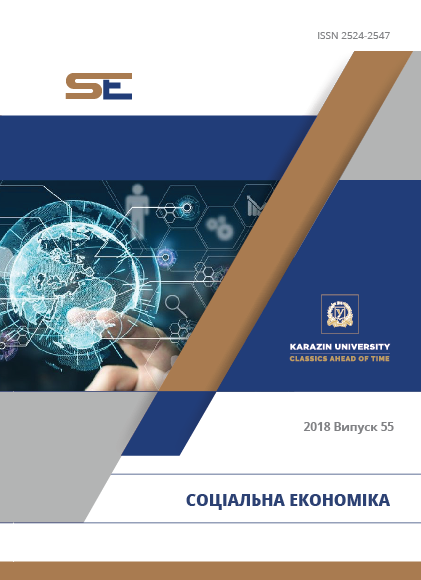Intellectual Entrepreneurship as a Driver for the Development of Innovation Economy
Abstract
The article is devoted to the comprehensive study of changes in modern trends in the use of innovative technologies characterized by the transition to knowledge economy and information society, which in many respects determine the economic and social type of development of the international and national economy. The article reveals the problems, the main directions and prospects in the category of «intellectual enterprise». The authors focus on the role of innovation in the modern world, its active dissemination, introduction into all spheres of economic activity, emergence of new technologies, intellectualization and informatization of production. The authors propose the proper definition of the category of «intellectual enterprise». Particular attention is paid to the relevance of intellectual entrepreneurship in modern conditions, which primarily happens due to active changes of such concepts as «knowledge», «trade», as well as constant reorientation of modern trends. The entrepreneurial sector determines the preconditions for the formation of qualitative changes of an economic and social nature, based on the introduction of innovations and self-organization of business entities. As exploratory task, the authors identified an attempt to evaluate intellectual entrepreneurship in the context of innovation on the example of developed countries. This direction is also supplemented by consideration of current trends in the development of intellectual entrepreneurship in Ukraine, which today, unlike many developed countries, is just being initiated in the realities of Ukrainian business environment. In the end, certain measures were proposed those could provide the necessary processes for creating a supportive environment where the process of formation, growth, use and creative processing of already existing data and information as a resource for creating innovative solutions in Ukraine will take place.
Downloads
References
Say, J.B. (2000). A Treatise on Political Economy [“Traktat po politicheskoy ekonomii”]. Moscow: The Case.
Weber, M. (2006). Protestant ethics and the spirit of capitalism [“Protestantskaya etika i dukh kapitalizma”]. Moscow: The Russian Political Encyclopedia.
Schumpeter, J. (2007). The theory of economic development. Capitalism, socialism and democracy [“Teoriya ekonomicheskogo razvitiya. Kapitalizm, sotsializm i demokratiya”]. M.: EKSMO.
Cherwitz, R. (2002). Intellectual entrepreneurship. A vision for graduate education. Change, 2002, pp. 23–27.
Salihova, Z. (2014). Intellectual entrepreneurship as a form of realization of intellectual capital [“Intellektual’noye predprinimatel’stvo kak forma realizatsii intellektual’nogo kapitala”]. Ekonomicheskiy analiz: teoriya i praktika, 20(371), pp. 44–52.
Ostrovskaya, G. (2017). Intellectual entrepreneurship in a new paradigm of management [“Intelektual’ne pidpryyemnytstvo v umovakh novoyi paradyhmy hospodaryuvannya”]. Visnyk Ternopil’s’koho natsional’noho ekonomichnoho universytetu, 2, pp. 83–97.
Kvitka, A. and Kramarenko, A. (2018). From big business to small and medium-sized enterprises: factors and prospects. Problems and Perspectives in Management, 16(2), pp. 42–48.
Konstantinov, G. and Filonovich, S. (2005). Intellectual entrepreneurship, or principles of gaining a competitive advantage in the new economy [“Intellektual’noye predprinimatel’stvo, ili printsipy obreteniya konkurentnogo preimushchestva v novoy ekonomike”]. Harvard Business Review – Russia, pp. 48–57.
Dorofeev, M. (2017). Jedi techniques. How to raise your monkey, empty the inbox and save thought-fuel [“Dzhedayskiye tekhniki. Kak vospitat’ svoyu obez’yanu, opustoshit’ inboks i sberech’ mysletoplivo”]. M.: Mann, Ivanov and Ferber.
Carr, N. (2005). Shine and poverty of information technology. Why IT is not a competitive advantage [“Blesk i nishcheta informatsionnykh tekhnologiy. Pochemu IT ne yavlyayutsya konkurentnym preimushchestvom”]. M.: Company’s secret.
Levy, A. (2017). Here comes the ICO, a wild new way for cryptocurrency start-ups to raise money. [online] Available at: https://www.cnbc.com/2017/05/25/bitcoin-ico-cryptocurrency-start-up-civic-raising-money-initial-coin-offering.html [Accessed 29 May 2018].
Yurina, N. (2016). Activity of Business Entities of Ukraine: Statistical Component [“Diyal’nist’ sub’yektiv pidpryyemnytstva Ukrayiny: statystychna skladova”]. Bulletin of Economic Science of Ukraine, 1(30), pp. 182–187.
Peredery, K. (2015). How to build an economy of innovation in Ukraine [“Kak postroit’ v Ukraine ekonomiku innovatsiy”]. [online] Available at: https://delo.ua/business/kak-postroit-v-ukraine-ekonomiku-innovacij-295863 [Accessed 29 May 2018].
Www.globalinnovationindex.org. (2017). The Global Innovation Index 2017. The Human Factor in Innovation. [online] Available at: https://www.globalinnovationindex.org/gii-2017-report [Accessed 29 May 2018].
Markina, I.A. (2017). Management of the socio-economic system in the context of national and global challenges: monograph. Poltava.




